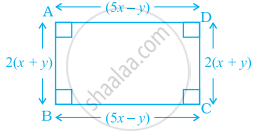Advertisements
Advertisements
Question
The sum of first n natural numbers is given by `1/2n^2 + 1/2n`. Find the sum of natural numbers from 11 to 30.
Solution
Given, sum of first n natural numbers = `1/2n^2 + 1/2n`
Sum of natural numbers from 11 to 30 = Sum of first 30 natural numbers – Sum of first 10 natural numbers
= `[1/2(30)^2 + 1/2(30)] - [1/2(10)2 + 1/2(10)]`
= `900/2 + 30/2 - 100/2 - 10/2` ......[Divide each term by 2]
= 450 + 15 – 50 – 5
= 410
APPEARS IN
RELATED QUESTIONS
Write down the following in the product form: 6y5
Write down the following in the product form: 9xy2z
Write down the following in the product form: 10a3b3c3
Find two numbers such that one of them exceeds the other by 18 and their sum is 92.
Mrs. Goel is 27 years older than her daughter Rekha. After 8 years she will be twice as old as Rekha. Find their present ages.
The perimeter of the triangle shown in the figure is ______.
The area of a square having each side x is ______.
If m is a whole number, then 2 m denotes a multiple of 2.
The additive inverse of an integer x is 2x.
The diameter of a circle is a line which joins two points on the circle and also passed through the centre of the circle. (In the adjoining figure AB is a diameter of the circle; C is its centre.) Express the diameter of the circle (d) in terms of its radius (r).

The expression for the number of diagonals that we can make from one vertex of a n sided polygon is ______.
Find the perimeter of the figure given below:

The sum of squares of first n natural numbers is given by `1/6n(n + 1)(2n + 1)` or `1/6(2n^3 + 3n^2 + n)`. Find the sum of squares of the first 10 natural numbers.
The sum of the multiplication table of natural number ‘n’ is given by 55 × n. Find the sum of table of 7.
The sum of the multiplication table of natural number ‘n’ is given by 55 × n. Find the sum of table of 19.
If ![]() = 2x + 3,
= 2x + 3, ![]() = `3/2x + 7` and
= `3/2x + 7` and ![]() = x – 3 then find the value of:
= x – 3 then find the value of:
2![]() +
+ ![]() –
– ![]()
If ![]() = `3/4x - 2` and
= `3/4x - 2` and ![]() = x + 6, then find the value of:
= x + 6, then find the value of:
![]() –
– ![]()
Write an expression for the sum of 1 and twice a number n. If you let n be any odd number, will the result always be an odd number?
